Posted by Umm Sahl in Funeral Rites, Prayer | 5 Comments
Janazah Prayer
To read the previous part: Click Here
By Sheikh Ahmad Kutty
According to ta famous and authentic hadith, the Prophet (upon whom be Allah’s blessings and peace) considers attending funerals as one of the most fundamental duties of brotherhood. ( See Bukhari and Muslim). Since it brings countless blessings, every Muslim should hasten to participate in funerals as often as possible. The purpose of the Janazah prayer is to seek pardon and forgiveness on behalf of the deceased.
In Fiqh (Islamic Jurisprudence) Janazah prayer is classified as a fard kifayah. This means it is the collective duty of the Muslim community. If some people perform it, then all are free from blame, but if no one performs it, then all are held responsible.
However, the greater the number of people praying, the better it is for the mayyit (deceased).
There is a general misconception that women are not permitted to pray Janazah. This is totally baseless from an Islamic point of view. Islam does not insist that women come out for Janazah, as it might inconvenience them with respect to their duties toward their homes and children. Nevertheless, this is no way implies that women can be prevented from performing the funeral prayer. They make take part if they are in a state of purity. This can be inferred from the fact that the mothers of the faithful, such as Aishah, Umm Salmah etc used to pray Janazah.
In Janazah there is no ruku (bowing) nor sujud (prostration). The entire prayer is done in standing position, and it consists of four takbirs and salam. It is recommended that the prayer lines be odd in number, for example three or five.
It is also recommended that the closest male relative of the deceased lead the prayer. But if such a person is not available or does not wish to do so, then the Imam or any other knowledgeable person may lead the prayer with the family’s permission.
The mayyit should be placed in front of the Imam. If it is a male, the Imam should stand near the head, if it is a female then he should stand towards the middle. If prayer is being conducted simultaneously on a male (s) and female (s), then the male should be placed closer to the Imam.
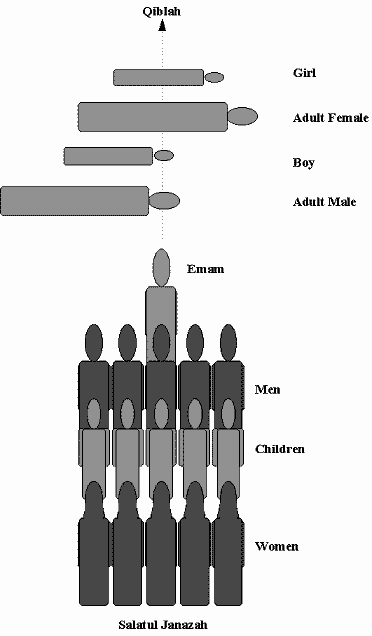
Before starting the prayer, as usual with every salah, the niyaah (intention) should be made. It is not necessary to pronounce the niyyah in words, since the niyyah comes from the heart. Niyyah means to have the sincere intention of praying for the mayyit. The Prophet (upon whom be Allah’s blessings and peace) said, “When you pray for a mayyit, pray sincerely on his behalf.”(Reported by Abu Dawud).
The following are the steps to be taken in a Janazah Prayer:
- The Imam should pronounce takbeer saying: Allahu Akbar
- Read Surah Fatihah
- Pronounce a second takbeer
- Read the benedictions on the Prophet (al -Ssalatul Ibraheemiyyah or durood Shareef)

- Pronounce a third takbeer: one should pray for mercy and forgiveness on behalf of the mayyit. He may recite one or more of several du’as transmitted from the Prophet (upon whom be Allah’s blessings and peace). Four of them are given below: [mp3:http://www.ryadussalihin.org/audioar/Chap_055.mp3]
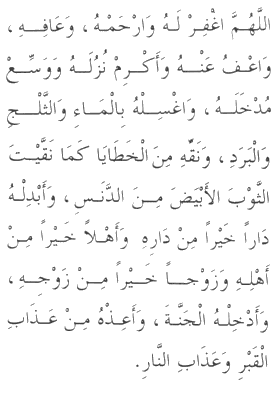
Allaahum-maghfir lahu warhamhu, wa ‘aafihi, wa’fu ‘anhu, wa ‘akrim nuzulahu, wa wassi’ mudkhalahu, waghsilhu bilmaa’i waththalji walbaradi, wa naqqihi minal-khataayaa kamaa naqqaytath-thawbal-‘abyadha minad-danasi, wa ‘abdilhu daaran khayran min daarihi, wa ‘ahlan khayran min ‘ahlihi, wa zawjan khayran min zawjihi, wa ‘adkhilhul-jannata, wa. ‘a’ithhu min ‘athaabil-qabri[wa ‘athaabin-naar].
O Allah, forgive him and have mercy on him and give him strength and pardon him. Be generous to him and cause his entrance to be wide and wash him with water and snow and hail. Cleanse him of his transgressions as white cloth is cleansed of stains. Give him an abode better than his home, and a family better than his family and a wife better than his wife. Take him into Paradise and protect him from the punishment of the grave [and from the punishment of Hell-fire]. (Reference: Muslim)
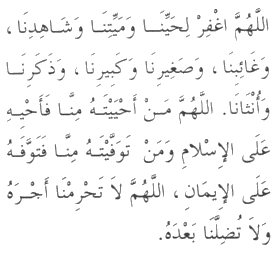
Allaahum-maghfir lihayyinaa, wa mayyitinaa, wa shaahidinaa, wa ghaa’ibinaa, wa sagheerinaa wa kabeerinaa, wa thakarinaa wa ‘unthaanaa. Allaahumma man ‘ahyaytahu minnaa fa’ahyihi ‘alal-‘Islaami, wa man tawaffaytahu minnaa fatawaffahu ‘alal-‘eemaani, Allaahumma laa tahrimnaa ‘ajrahu wa laa tudhillanaa ba’dahu.
O Allah forgive our living and our dead , those who are with us and those who are absent, our young and our old , our menfolk and our womenfolk. O Allah, whomever you give life from among us give him life in Islam, and whomever you take way from us take him away in Faith . O Allah , do not forbid us their reward and do not send us astray after them. (Reported by Abu Dawud)
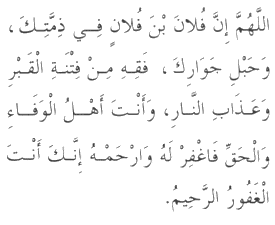
Allaahumma ‘inna [name the person] fee thimmatika, wa habli jiwaarika, faqihi min fitnatil-qabri wa ‘athaabin-naari, wa ‘Anta ‘ahlul-wafaa’i walhaqqi. Faghfir lahu warhaw.hu ‘innaka ‘Antal-Ghafoorur-Raheem.
O Allah, surely [name the person] is under Your protection, and in the rope of Your security, so save him from the trial of the grave and from the punishment of the Fire. You fulfill promises and grant rights, so forgive him and have mercy on him. Surely You are Most Forgiving, Most Merciful. (Reported by Abu Dawud)
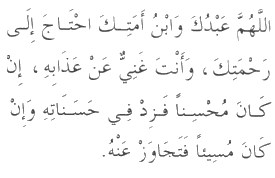
Allaahumma ‘abduka wabnu ‘amatika ihtaaja ‘ilaa rahmatika, wa ‘Anta ghaniyyun ‘an ‘athaabihi, ‘in kaana muhsinan fazid fee hasanaatihi, wa ‘in kaana musee’an fatajaawaz ‘anhu.
O Allah, Your male slave and the child of Your female slave is in need of Your mercy , and You are not in need of his torment . If he was pious then increase his rewards and if he was a transgressor then pardon him. (Reported by al-Bayhaqi)
Note: If the mayyit is a child, then the following du’a should be recited:
[mp3: http://www.ryadussalihin.org/audioar/Chap_056.mp3]
Allaahumma ‘a’ith-hu min ‘athaabil-qabri. [or say:] Allaahum-maj’alhufaratan wa thukhran liwaalidayhi, wa shafee’an mujaaban. Allaahumma thaqqil bihi mawaazeenahumaa wa ‘a’dhim bihi ‘ujoorahumaa, wa ‘alhiqhu bisaalihil-mu’mineena, waj’alhu fee kafaalati ‘Ibraaheema, wa qihi birahmatika ‘athaabal-jaheemi, wa ‘abdilhu daaran khayran min daarihi, wa ‘ahlan khayran min ‘ahlihi, Allaahum-maghfir li’aslaafinaa, wa ‘afraatinaa wa man sabaqanaa bil’eemaan.
O Allah, protect him from the torment of the grave. [It is also good to say:] O Allah, make him a precursor, a forerunner and a treasure for his parents and an answered intercessor. O Allah, make him weigh heavily in their scales (of good) and magnify their reward. Make him join the righteous of the believers. Place him in the care of Ibrahim. Save him by Your mercy from the torment of Hell. Give him a home better than his home and a family better than his family. O Allah, forgive those who have gone (i.e. passed away) before us, our children lost (by death), and those who have preceded us in Faith.
- Say a Fourth Takbeer
- Make Salam either on one (right) side or on both sides. both ways have been authentically reported from the Prophet (upon whom be Allah’s blessings and peace)
Allaahumma salli ‘alaa Muhammadin wa ‘alaa ‘aali Muhammadin, kamaa sallayta ‘alaa ‘Ibraaheema wa ‘alaa ‘aali ‘Ibraaheema, ‘innaka Hameedun Majeed. Allaahumma baarik ‘alaa Muhammadin wa ‘alaa ‘aali Muhammadin, kamaa baarakta ‘alaa ‘Ibraaheema wa ‘alaa ‘aali ‘Ibraaheema, ‘innaka Hameedun Majeed.
O Allah, bestow Your favor on Muhammad and on the family of Muhammad as You have bestowed Your favor on Ibrahim and on the family of Ibrahim, You are Praiseworthy, Most Glorious. O Allah, bless Muhammad and the family of Muhammad as You have blessed Ibrahim and the family of Ibrahim, You are Praiseworthy, Most Glorious
To read the next part: Click Here

 Umm Sahl, your sister in Islam, a wife and mother of 3 beautiful blessed babies
Umm Sahl, your sister in Islam, a wife and mother of 3 beautiful blessed babies
"A Muslim has five rights upon other Muslims: responding to his Salam, answering his invitation (to food), making Tashmeet when he sneezes, visiting him when he is sick, and following his Janazah when he dies." (Bukhari and Muslim).
Prophet Muhammad (P.B.U.H) said : " If a Muslim dies and forty Muslims, who do not associate anything with Allah , join in the Salatul Janazah, Allah accepts their prayers for him."(Muslim)
MashaAllah i never knew these… JazakaAllah Khair Sister
A VERY INFORMATIVE ARTICLE.THANK YOU.
Jazakallahu khairan for this post.This should be known by every muslims since we all will die and our close family members too..If we know these duas,it will really help us to pray for them sincerely.
Thanks Shayista..for posting such an informative article…May Allah help you in all your future works..Ameen…